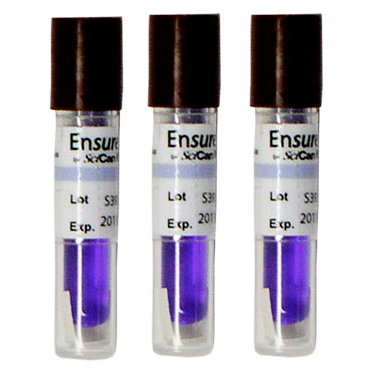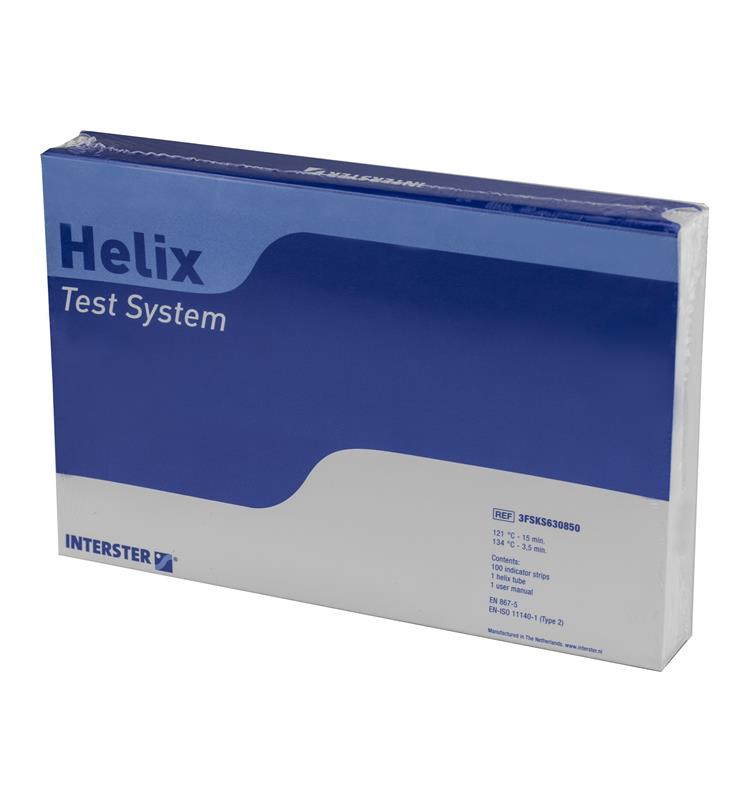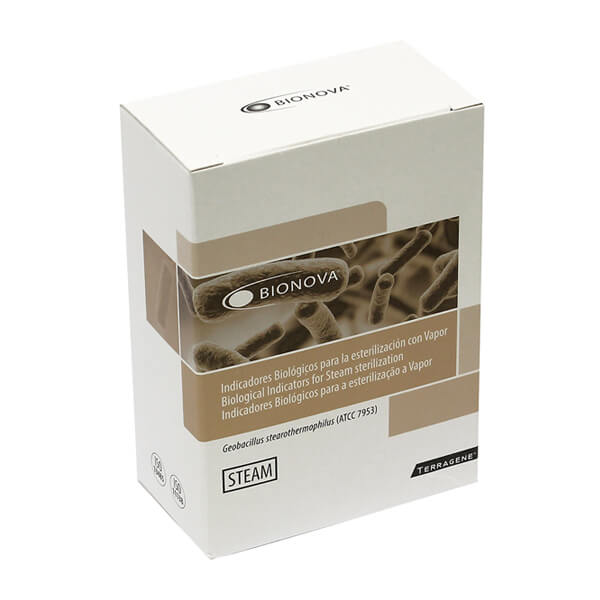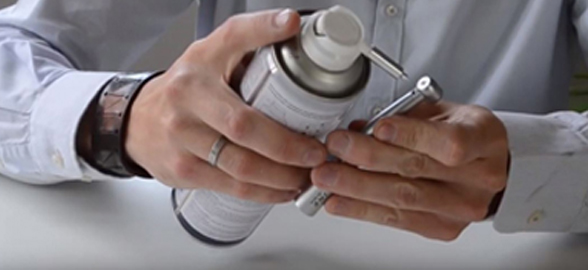The risk of transmiting infectious diseases in dental clinics is high due to contaminated material and is a problem that has not been solved despite the efforts invested
In this snese, the correct use of autoclaves is a resource of fundamental importance that you should know about. For this reason, we have prepared this article where we will talk about:
- What is sterilisation and why it is so important
- What are autoclaves and how it works
- How to choose the best autoclave
- How to control sterilisation processes
- Legal regulations about sterilisation in Europe
Don’t miss it and keep reading!
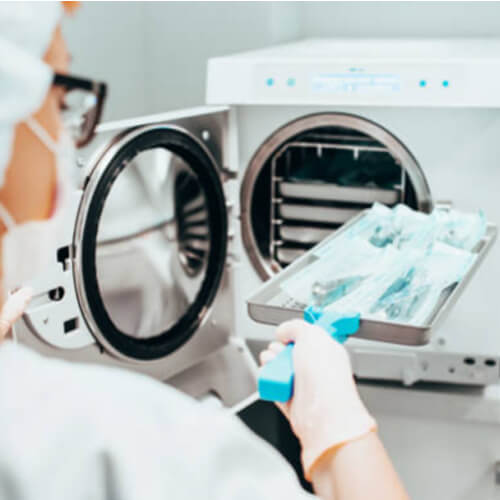
What is sterilisation and why is it so important?
When we talk about sterilisation, we refer to processes that have the purpose of destroying micro-organisms in all their varieties: bacteria, viruses, fungi and forms of resistance, such as spores.
To achieve this objective at the highest level, physical or chemical means are used, which must be capable of denaturing the proteins essential for the life and reproduction of these germs.
Nosocomial infections are those that occur in healthcare facilities, including, as you might expect dental clinics. They are known as HAIs, Healthcare Associated Infections, and affect both patients and staff exposed to certain procedures.
According to the World Health Organisation, these pathologies affect more than 2,000,000 people worldwide each year, of whom 100,000 die from them. The higher-risk infections are hepatitis B y C, y el HIV.
Chemical methods are carried out by immersing the objects to be sterilised in a 2% glutaraldehyde solution, or by exposing them to hydrogen peroxide or ethylene oxide gas. Physical methods are based on heat, which may be dry or in the form of water vapour.
The Effective sterilisation is able to break the chain of transmission from the micro-organism's reservoir, or habitat where they live and proliferate, to the host susceptible to infection.
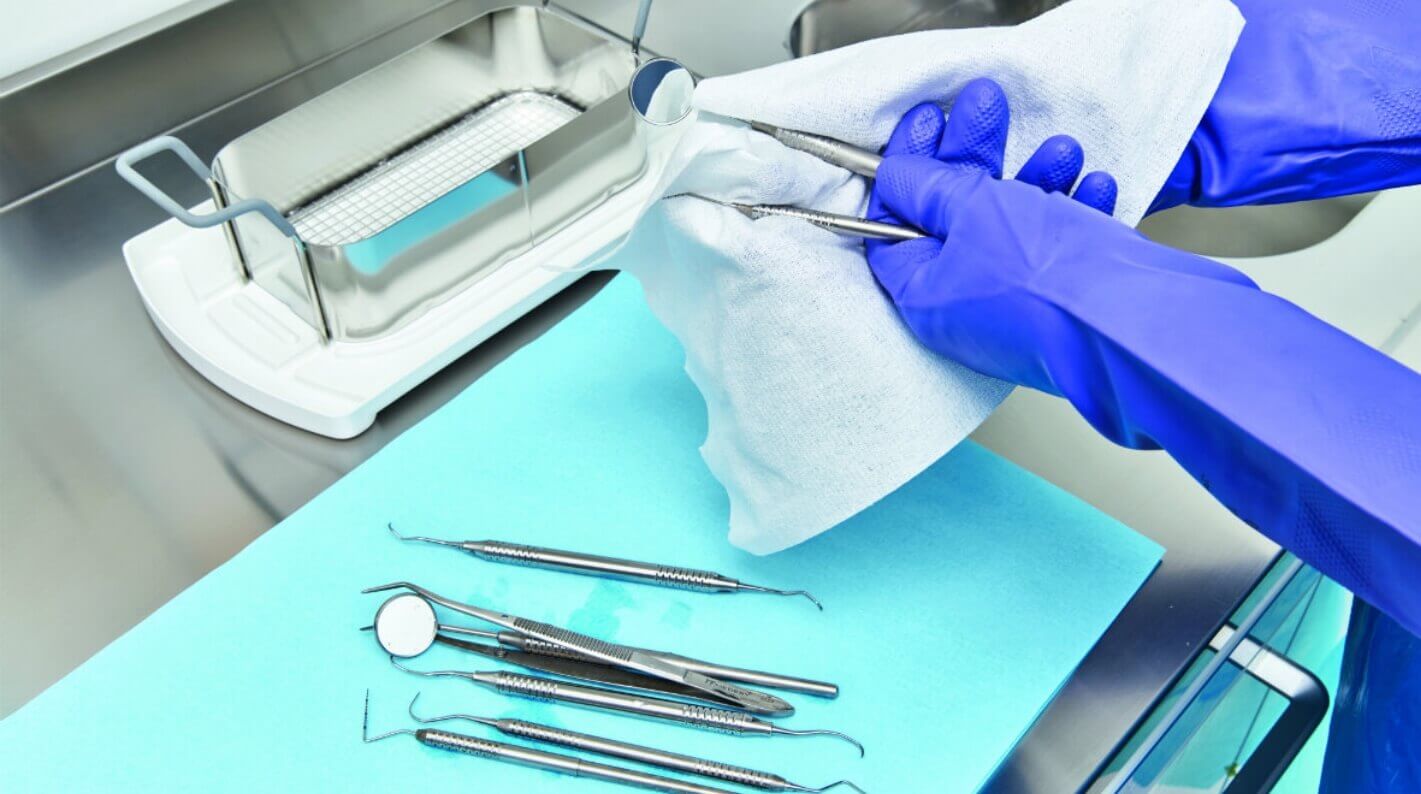
What are autoclaves and how it works?
The best dental autoclave will be a device specifically designed to sterilise dental tools and materials. It is a metal container that is capable of withstanding pressure and inside which is placed what needs to be processed.
An autoclave must eliminate all microbial life, but without leaving toxic residues, and three parameters are used to achieve these purposes: time, heatand pressure. The procedure is suitable for textiles and metal or glass objects.
Not all plastic objects can be sterilised and for this reason it is important to follow the manufacturer's instructions before putting any plastic in the autoclave. There are plastic items that can be sterilised, e.g. trays or retractors.
The pressure allows the temperature inside the vessel to rise above 100°C. A modern autoclave removes all micro-organisms in 5 minutes at pressures of 200Pa and a temperature of 134°C. The operations are electronic and records of all processes are kept. It is also possible to review the parameters during each stage. Since its creation in 1682, the autoclave has evolved considerably and is now a simple and essential piece of equipment in the dental clinic.
What to look when choosing the best autoclaves in dentstry?
This equipment comes in three classes:
- N (of Naked) are used for products without packaging, solid and for immediate use.
- S (Specific) autoclaves are used for porous or packed materials, and instruments with lumens.
- A Class B (Big) autoclave is large and can process any packaged or unpackaged load: solid, porous and hollow materials. It has very useful cycles, which allow you to check steam penetration, and there are gravitational or vacuum cycles. It also has functions such as data logging and processing, which is mandatory.
The Class B autoclave is the most suitable for dental clinics, although it is also used in tattoo parlours and beauty clinics. When choosing an autoclave of this type it is advisable to take the following aspects into account, so that you can get the best performance.
Dental autoclave capacity
It ranges from 8 to 24 litres, allowing you to adapt the available space to the sterilisation needs. A small capacity will make the processes more complex and slower. On the other hand, an excessive one will force you to incur unnecessary expenses, as they are more expensive and will consume a disproportionate amount of energy.
What is the duration of the cycle?
Sterilisation equipment that cycles quickly is more expensive, but saves you time. When choosing your dental autoclaves, this consideration will depend on the demand your clinic generates.
Technical Service
The maintenance and repair of a dental autoclave is a service that is related to the brand. It is necessary to make sure that this service is available in your country, as well as to check the warranty period, which is usually between one and two years.
Drying
It is essential that the autoclave has a final drying phase. Any object that is wet, be it a device or the packaging bag, cannot be considered sterile. On the other hand, many instruments have their useful life reduced when water is left inside.
Here are autoclaves with different capacities and features so that you can choose the one that best suits your needs:
Bader Class B autoclave (18 liters)
This Bader autoclave sterilises medical, surgical and dental instruments, specially designed for clinics, hospitals, laboratories, etc. It has the latest technology and characteristics such as USB port, water quality sensor, safety valve and LCD display:
- It has a condensed water collector that prevents steam from contaminating the environment.
- The steriliser uses a micropocessor with an intelligent control system.
- Lock: electrical + mechanical.
- Thermal printer.
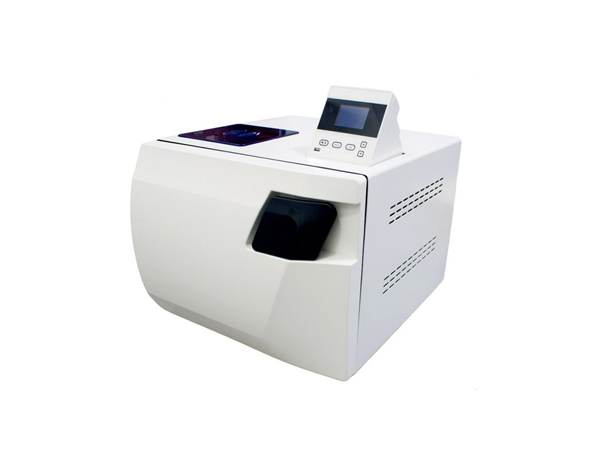
Lara: Class B Autoclave with touch screen (17 and 22 litres)
It helps to save time and money while providing the best possible protection for your patients and staff. And it also has the advantage of short sterilisation process. Look at its features!:
- Sterilises instruments in under 20 minutes.
- Automatic saving of cycles on USB.
- Automatic water filling connection integrated.
- Improves your workflow and avoids operational mistakes.
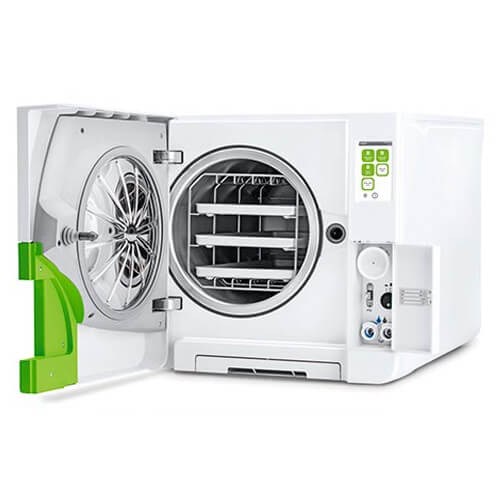
How are sterilisation processes controlled?
The European law 13060 on sterilisation published in June 2004 establishes a protocol that includes a series of mandatory steps for a correct sterilisation process that promotes the prevention of cross-infection.
These phases are: collection, using individual protective equipment, disinfection, cleaning, drying, packaging, traceability and finally sterilisation in the autoclave. In addition, there are several tests that serve to verify the functioning of the equipment:
- Physical test: which assesses the parameters of time, pressure and temperature and must be carried out daily.
- Biological test: requires the use of devices containing spores, and is performed every three months to evaluate the autoclave's capacity to destroy them.
- Helix test: this test checks the penetration of water into the small cavities. It is performed on a monthly basis.
- Bowie & Dick test: it is carried out every 30 days, in order to verify the real penetration of steam into the porous bodies.
- Vacuum test: it is carried out every 15 days and checks the capacity to maintain the vacuum.
The Sterilisation tests are very important to check the correct functioning of any sterilisation method and to ensure that they are not contaminated and cause a health risk.
Here are some quick and safe sterilisation tests for your dental clinic:
Autoclaves are very efficient equipment and, if used properly, they guarantee the sterility of dental instruments, devices and materials. They are an indispensable resource for the care of patients and staff in your daily practice.
It is important to establish sufficient hygiene protocols, as any error can have very harmful consequences for patients, remember!
To keep up to date with all the latest news in the dental sector, we invite you to follow our social networks and youtube channel, don't miss anything, see you soon!

